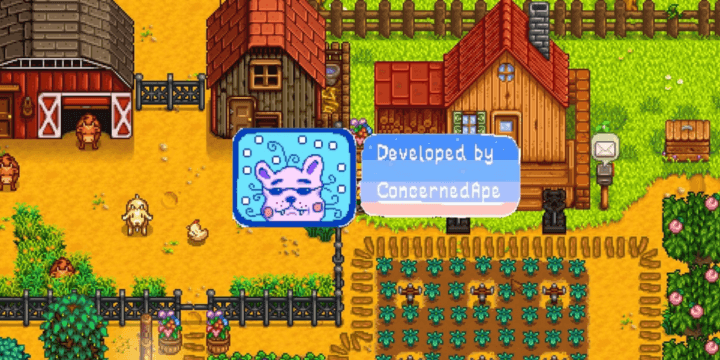How did I improve my game dev productivity?
If, like me, the things you were most afraid of when you set out to create your game are:
- running out of ideas
- having your concepts stolen
- choosing the wrong game engine
- not finding the right name
What I’m about to tell you may not be pleasant to hear, but chances are you’re overestimating your perseverance.
Of course, the concept of the game is very important, and of course we’ve all heard the story of the guy who had his genius idea stolen by a crooked multinational. But how many games never see the light of day because their creators abandon them along the way? Did you know that Stardew Valley developer Eric Barone spent 4 years working solo on his game before launching it? Impressive perseverance, isn’t it?

With a little hindsight, I realize that beyond having the famous good idea that will revolutionize the video game industry, it takes a lot of strength of mind to resist all the distractions life has to offer (and I’m thinking more of the attention economy than a good beer) in order to move forward with your project.
Now, I’d like to share with you a few tips I use on a daily basis to increase my productivity and the chances of publishing my game one day.
Limiting social networking
If it’s free, you’re the product. In the age of social networking (I sound like the Boomer I am, give me a break), this sentence is distressingly true. These platforms make their money in two ways: advertising, and your data. The equation is pretty simple: the more time you spend on the networks, the more ads you see, the more data you send, and the more cash they make. So it’s in their interest to get you to spend as much time as possible with them.
If you’re interested in the concept and want to learn more, I believe it’s called the attention economy.
Becoming aware of the time spent scrolling
In addition to the harmful effects on our health that numerous studies point to, you can’t imagine how long it takes to scroll. To scare you off, you can, at your peril, look on your Android smartphone in “Settings”, then “Digital wellbeing and parental control” to bring up a graph that illustrates your phone usage over the course of the day.
Far be it from me to blame you, I personally love to scroll and I find so many interesting things on Insta, Tiktok & Twitter that I don’t intend to do without them. Let’s just say I’m trying to raise awareness of the abyss it can be.
2. Put my smartphone to sleep
To gain in productivity, I remove anything that might interrupt my current task. Even if I can’t deactivate my cat, I can do the same for man’s other best friend, the smartphone. I’ve got into the habit of putting it away from my desk or using the ForestApp app, which helps me keep it away from my desk while I’m working. The great thing about today’s smartphones is that almost all of them have a “Do Not Disturb” mode, so you can mute notifications. It’s up to you to set this up.
If you don’t like this one, I’ve discovered StayFree – more radical, less friendly and it does the job really well.
The results? Fewer interruptions, greater concentration and higher productivity.
3. A suitable working environment
Whether it’s visual, acoustic or physical discomfort, I believe that a healthy work environment is essential to my efficiency. Construction noise, crowded cafés, uncomfortable chairs and slow connections are all hindrances to my productivity. I like to work in a quiet place, accompanied by a Matcha Latte (which isn’t just a bobo thing where I am at the moment), with plenty of light.
Who was it who said, “Get your head right, get your game right”?

4. Reuse your code
If you’re involved in video game development, I’m going to let you in on a poorly-kept secret about how to be more efficient: reuse your code.
I invite you to take a look at Object Oriented Programming, with its notion of inheritance (the Parent/Child concept in Game Maker Studio), or the use of functions. As soon as you have objects in your game that work in a similar way, chances are you can save time by reusing your code. This way, you avoid duplicating when you don’t have to, and save time on maintenance.
5. Naming your variables & commenting your code
And no, the super-developer I was three months ago probably doesn’t remember the usefulness of theVariable2 = 1, because neither its name nor the lack of comments help me. Whereas a well-named variable, such as bulletVelocityX = 1, will be easily understood, both by its creator and by the people who will one day read its code.
Then, without turning my code into a living documentation, a few well-placed comments will always be a precious help to a developer in distress.
6. Write down your objectives
Writing down your goals increases your chances of achieving them. I usually open my Git Hub project and put in my next steps. The shorter and more concise, the better. I like to add a deadline, a status (to do, in progress, done) and a category to have more visibility. I also try to keep it as realistic as possible, because writing down “Finish my game” just doesn’t work.
Special mention if I share my goals with someone else, in a way it forces me to move forward, and I’m even more likely to validate them.
7. Taking breaks
Contrary to popular belief, taking a break is not a waste of time.
For a while, I used the Pomodoro Timer technique, which enabled me to alternate breaks and work sessions. If you’re struggling to manage your time, I urge you to take a look at this method.
8. Save your work online
A cat jumping on the desk and spilling coffee all over your brand-new MacBook Pro? The Windows update that restarts the computer without asking? The power cut that happens just when I’m thinking of pressing the save button? Yes, of course this only happens to other people. But in the unfortunate event that I have to pay the price, I’ve taken the precaution of saving my work online.
I save everything on Dropbox, which is an online storage service, and version my project with Github. Taking the time to protect my data takes a few minutes and costs me a bit of money, but it’s a relief to feel safe.
9. Upstream research
Google is my friend, and I’m sure someone has asked “how to create a rogue like” before. I often save myself a lot of headache by doing a quick search before tackling a new script. Similarly, when I’m making pixel art, a trip to Pinterest and Twitter gives me inspiration from the best (and there are many), so I can avoid the blank page syndrome.
10. Join a community
This point is somewhat related to the previous one: the power of collective intelligence has been proven. Many times I’ve asked questions on the Game Maker Studio discord (the game engine I use), and it’s a real time-saver not to find yourself alone with your problems. Whether on Discord, Twitter, Facebook, Linkedin, or even a dark skyblog, being accompanied by other people can unblock many situations.
Conclusion
Here’s a non-exhaustive list of things that help me improve my productivity, in the hope that it will help you in your quest for performance! And if you have any tips to share, I’d love to hear from you in the comments.